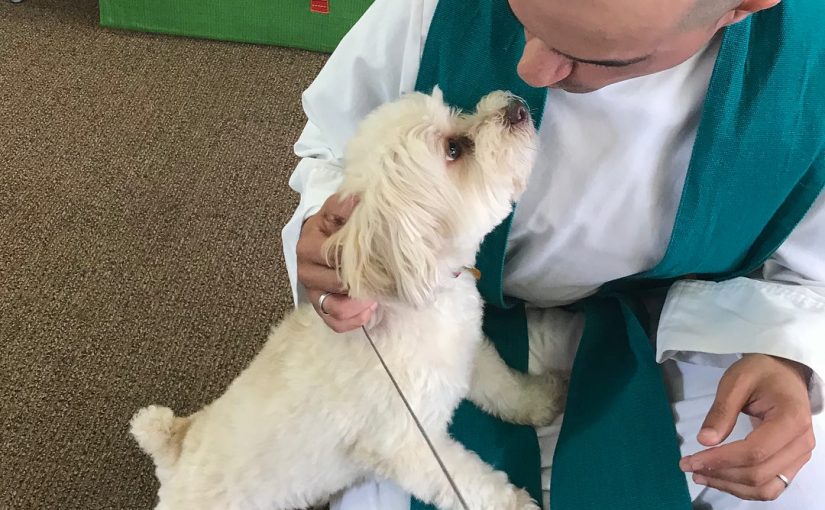On that day, when evening had come, [Jesus said to the disciples], “Let us go across to the other side.” And leaving the crowd behind, they took him with them in the boat, just as he was. Other boats were with him. A great windstorm arose, and the waves beat into the boat, so that the boat was already being swamped. But he was in the stern, asleep on the cushion; and they woke him up and said to him, “Teacher, do you not care that we are perishing?” He woke up and rebuked the wind, and said to the sea, “Peace! Be still!” Then the wind ceased, and there was a dead calm. He said to them, “Why are you afraid? Have you still no faith?” And they were filled with great awe and said to one another, “Who then is this, that even the wind and the sea obey him?”
Mark 4:35-41
My sermon from 5th Sunday after Pentecost (June 24, 2018) on Mark 4:35-41. Listen to the recording at the bottom of the page or read my manuscript below.
****************************
Let me know if this has happened to you. You come home after a busy day and you’re completely worn out. Your feet hurt. Your back is sore. And your brain can’t think straight. You take off your jacket with the intention of hanging it in the hall closet but gravity is extra strong today so the jacket slides off the hanger and lands on the floor. You could pick the jacket up but you need a moment to ready yourself. And it’s in that moment when something shows up to remind us that we’re not alone. Because without warning and without us even noticing, our pets sneak up and sit on that jacket. These fuzzy and scaly super spies will sit on anything that falls onto the floor. A stray jacket becomes a new bed. A shirt that didn’t make it into the laundry basket becomes their new lounge. In fact, anything that lands on the floor – from bubble wrap to a vinyl raincoat to a new couch cushion – everything becomes a pet’s new throne. Our pets know what we don’t want them to sit on and so that’s exactly what they do. They curl up on it, fall asleep, and look downright adorable. We want to move them but we feel bad. So we leave them there on that jacket, shirt, or cushion, and we just watch them, wondering when we got so gullible.
I’m pretty sure the disciples, in our reading from the gospel according to Mark today, didn’t think Jesus looked super adorable as he slept on that cushion in the boat. But they probably did wonder when they got so gullible about Jesus. They were in the middle of the Sea of Galilee, a shallow lake that several of the disciples had fished in for years. They knew this lake and they knew how quickly storms showed up. Once the weather started to shift, the disciples knew the threat that was coming. These followers of Jesus looked at the storm around them, knowing it was too late to turn back. So they looked at the boat itself, hoping it was strong enough to last. But their boat was small, the size of a large canoe, and the waves started flooding it. They realized how much trouble they were in and it’s then when they see Jesus, still asleep, on a cushion.
The disciples looked around and knew exactly the terror they were getting into. But in that very same moment, they looked at Jesus, and they were confused. Here was their teacher, their rabbi, who could cast out demons, cure the sick, and make someone’s withered hand brand new. This Jesus had spent the last few chapters preaching, teaching, healing, and inviting different kinds of people from different kinds of nations to cross their borders to see him. The disciples had seen him do amazing things and watched him bring new life to those society wanted to keep separated and locked away. Jesus, as he was, is God’s love lived out loud. Yet in this moment, as the storm raged, Jesus slept and I bet the disciples probably wondered why they were following him. We, like those first followers of Jesus, rarely imagine him to be a heavy sleeper. When trouble shows up, we want Jesus to be ready. We hope, and sometimes expect, Jesus to see our need and to fix us, right away. When we pray, we know how we want him to act. So when the storm comes, we want Jesus to be awake, like a well trained service dog, ready to respond. When we are in need, we don’t want Jesus to be asleep on a cushion.
But if we’re honest, there are times in our lives when Jesus napping on a cushion is exactly where we want him to be. Before the storm came, we have no hint in scripture that the disciples minded that Jesus was asleep. They were busy sailing their ships, rigging the sails, rowing the oars, and they had no problem with a Jesus snoring the evening away. As long as their journey was going the way they expected; as long as they were traveling along the path they found comfortable; as long as they thought Jesus wasn’t needed right away – the disciples were fine living as if Jesus wasn’t really there. Sure, Jesus was literally in the boat with them, but he was quiet, in the background, and he wasn’t causing any fuss. Jesus wasn’t in their way. Before the storm, he was the easy kind of Jesus to get along with because his nap induced silence seemed to affirm the status quo they were living in. When our life is going well or even when it’s just okay; when our challenges are real but they don’t confront a deep part of who we are – a Jesus asleep on the cushion is the kind of Jesus we expect we need. It’s a Jesus we assume we already know. It’s a Jesus we want to stay quiet. And we want him to be sleeping until the storm finally comes.
So I can understand, at a gut level, why the first thing out of the disciples’ mouth is: “Teacher, do you not care that we are perishing?” They didn’t ask for help. They didn’t ask to be saved. They simply wondered why Jesus didn’t care? I don’t know many people who haven’t asked this same question. And that question might be the most human and faithful question we can ask. When our heart breaks, when our strength fails, and when we notice the evil that surrounds us – asking if Jesus is asleep on a cushion is the most normal thing we can possibly do. We want him to act; we want him to show up; we want him to make his presence known. And we think, deep in our gut, that we know exactly what Jesus’ action will look like.
But we really don’t. And the disciples had no idea either. Scripture doesn’t tell us what the disciples thought Jesus might do but we know, based on their last question, that the calming of the storm wasn’t on their mind. Jesus slept because he trusted something the disciples didn’t. He knew that every single disciple and every person on those boats had Jesus, right there, with them. In the moments when we feel like we don’t need him, Jesus is there. And in those moments when we do, he’s there too. Having Jesus in our life doesn’t mean that we won’t face storms. And it doesn’t mean that the waves that hit us won’t swamp whatever ship we’re in. But when we have Jesus, when he comes to us in our baptism, when we meet him at the communion table, and when he shows up as we gather in his name – when we have Jesus, we have a savior who is with us 24/7. And this Jesus makes a difference in every moment of our lives. When Jesus, after he calmed the storm, asked the disciples, “Have you still no faith?” Jesus wasn’t asking them about what they think or what they believe. Instead, he’s asking if they have trust. And like a pet who shows up, uninvited and unannounced, to make their presence known by sitting on a jacket we didn’t hang up, Jesus is always with us and he invites us to trust that, no matter what, he will always show up and he will carry us through.
Amen.
Podcast: Play in new window | Download



